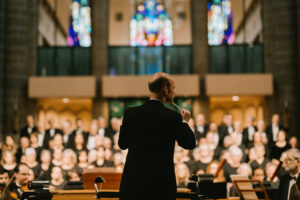Considering a requiem is meant to honour the dead, it’s intriguing to speculate on Mozart’s state of mind as he was allegedly dying of kidney disease while he wrote Requiem.
Victoria Choral Society will be performing Requiem alongside Mozart’s Laudate Dominum and Ave Verum Corpus at the first concert of their 90th anniversary season. Requiem is a particularly interesting story, shrouded in mystery and intrigue, because Mozart died before he could complete it, says Victoria Choral Society music director Brian Wismath.

“You’re 35 years old, you’re Mozart, you’re not imagining you’re going to die, but you’re obviously sick, and you’ve been asked to write this work by a mysterious person, in which you’re essentially going to be paying homage to death, while you are dying,” says Wismath. “At what point did Mozart realize he was dying? Did he make a connection with this piece that he was writing? Did he end up ultimately writing this piece for his own funeral?”
Requiem has had many attempts at completion over the last 233 years, so it’s interesting to note that the finished piece was not written entirely by Mozart. The most widely respected version (which will be performed at this concert) was finished during the year after his death by a close colleague. About a quarter of the work was fully completed, around half was roughly sketched out, and the final quarter was unwritten, says Wismath. However, despite it technically not being a “pure” work by Mozart, every effort is made to replicate his style and intent while finishing the piece.
“When it comes to who we credit this work to, there’s no question that it’s Mozart,” says Wismath. “Even the sections that were completed by other people, we can hear the elements that we know belong to Mozart’s unique and incredibly gifted approach to writing music. This version was completed in 1792 by Franz Süssmayr, who worked very closely with Mozart throughout his career, and arguably, Süssmayr was the person who knew Mozart’s music and style of writing the best. He knew this guy inside and out.”
Wismath says that it does pose an interesting conundrum for the conducting, interpretation, and performance of the piece, because the intent of the composer is unclear.
“I think that musicians are always considering what is the right way to do this, and the right way, the majority of the time, is answered by, what was the composer’s intent,” he says. “When you can’t answer that question, it leaves you guessing a little bit, and that is a really interesting place to be in when you’re used to being able to figure out exactly what the composer intended, and interpreting the music within that lens.”
Requiem is a popular work, not only for its enigmatic history, but also for its quality, and Wismath is confident that patrons will enjoy the performance.
“There’s a lot of mystery about it, and I think that’s one of the reasons why this work is so widely performed to this day, in addition to the fact that it is brilliantly written, and you can’t get around that,” he says. “The fact of the matter is that there’s mystery behind it, but audiences come to hear the music, to hear the setting of the text, in such a way that they want to hear it over and over and over again. It’s a very gripping and magnetic work.”
Mozart’s Requiem, Laudate Dominum, and Ave Verum Corpus
2:30 pm Saturday, November 16
$10 student tickets, Christ Church Cathedral
victoriachoralsociety.ca/concerts
